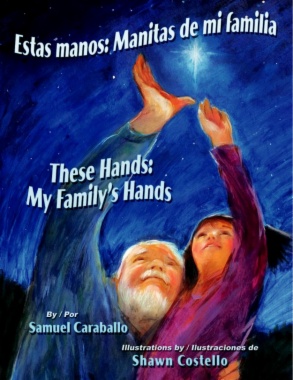

In this heart-warming ode to family, the young narrator compares the hands of family members to plants in the natural world. “Your hands, the most tender hands! / When I’m scared, / They soothe me,” she says to her mother. The girl compares her mother’s hands to rose petals, which represent tenderness in Latin America.
Her father’s hands are strong like the mahogany tree; her siblings’ friendly like the blooming oak tree. Grandma Inés’ are the happiest hands, like tulips that tickle and hug tightly. And Grandpa Juan’s are the wisest, like the ceiba tree, considered by many indigenous peoples of Latin America to be the tree of life and wisdom and the center of the universe. His are the hands that teach his granddaughter how to plant and care for the earth and how to play the conga drum.
She promises to give back all the love they have always given her, “Dad, when your feet get tired, / My hands will not let you fall.” Samuel Caraballo’s poetic text is combined with Shawn Costello’s striking illustrations depicting loving relationships between family members. An author’s note about Latin American symbols will introduce children both to the natural world and the idea that one thing can represent another.